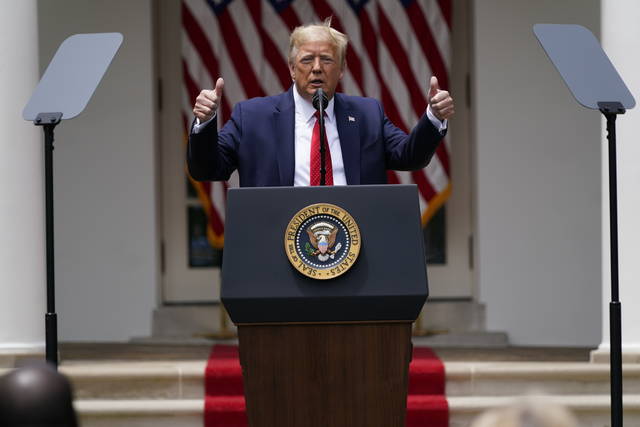Police departments in parts of Southwestern Pennsylvania applauded some elements of President Trump’s executive order on police reform and expressed skepticism toward others, particularly those aimed at bringing social services into some police situations.
Trump announced the executive order Tuesday in a Rose Garden press briefing after weeks of protests across the country demanding police and justice reform.
Among other changes, the order would use financial incentives to encourage police to adopt co-responder programs, in which social workers respond alongside police to nonviolent calls involving mental health, addiction and homelessness.
Capt. John Stafford of theGreensburg Police Department said he hasn’t seen the details of the executive order but is skeptical about social workers accompanying officers on calls. Mental health calls can turn violent unexpectedly, he said.
“The social worker thing could get bad, probably,” he said. “You have to watch to make sure they don’t get hurt. If they want to do something, get involved with these places before it gets to the point where we have to do it.”
Jeannette police Chief Shannon Binda also was hesitant to back having civilians at police situations.
“As far as having social (or) mental health workers going on calls, I’m not quite sure how that will work without seeing what the proposed plan is for that,” he said, noting that he is “all for more training.”
Another piece of the order establishes a database of officers with histories of complaints against them — an idea mirrored by parts of state-level legislation that passed unanimously through the Pennsylvania House Judiciary Committee on Monday.
In that bill, the Municipal Police Officers Education and Training Commission would run an electronic database that shows why officers have left employment — including whether it involved a substantiated case of misconduct. The bill would require departments to check the database before hiring an officer.
Delmont police Chief T.J. Klobucar said he has no problem with that portion of the executive order.
“I’m in favor of any way we can better police our communities and (make) people more comfortable with policemen policing their communities,” he said.
He reserved comment on the co-responder portion of the order, saying he would need to see more details.
Pittsburgh Police Chief Scott Schubert said that while he’s still reviewing the executive order, he’s open to any ideas from all levels of government and from the public.
“Each and every day our officers strive to uphold the ‘best practices’ in policing that the president referenced today,” he said. “We recognize that this is a time of transformation and an opportunity for healing in our country.”
He said his bureau is listening and welcomes the dialogue.
On a wider level, Patrick Yoes, president of the National Fraternal Order of Police, said the organization representing police “strikes a great balance between the vital need for public and officer safety, and the equally vital need for lasting, meaningful and enforceable police reform.”
“I believe we all share a common goal, and we look forward to working with the (Trump) administration and Congress in the days and weeks ahead,” said Yoes, an officer with the St. Charles Parish police outside New Orleans.
At the local level, the state Judiciary Committee approved a measure that would mandate training of officers for how to recognize and report child abuse and how to interact with people of various racial, ethnic and economic backgrounds.
It also would require annual training on the use of force, including how to de-escalate conflicts. Every two years, officers would have to undergo training on cultural awareness and implicit bias.
Staff writers Renatta Signorini, Jacob Tierney and Paul Peirce contributed.








